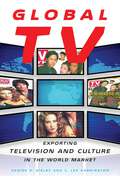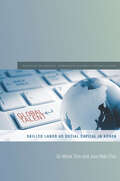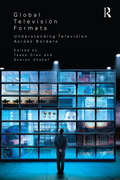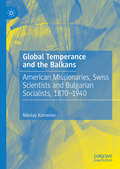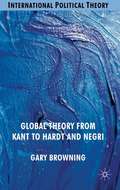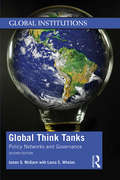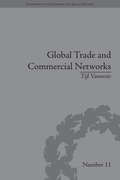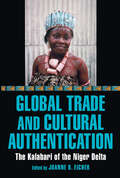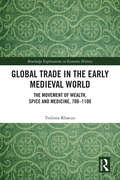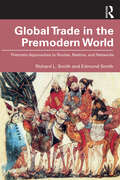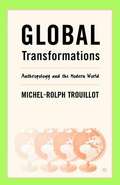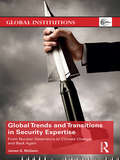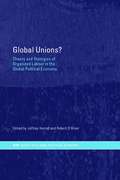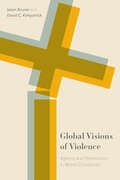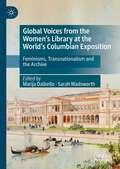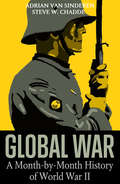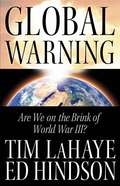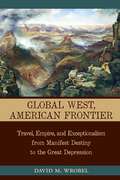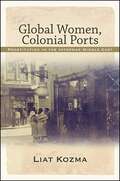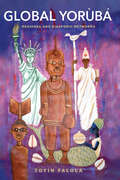- Table View
- List View
Global TV: Exporting Television and Culture in the World Market
by C. Lee Harrington Denise D. BielbyA reporter for the Los Angeles Times once noted that “I Love Lucy is said to be on the air somewhere in the world 24 hours a day.” That Lucy’s madcap antics can be watched anywhere at any time is thanks to television syndication, a booming global marketplace that imports and exports TV shows. Programs from different countries are packaged, bought, and sold all over the world, under the watch of an industry that is extraordinarily lucrative for major studios and production companies.In Global TV, Denise D. Bielb and C. Lee Harrington seek to understand the machinery of this marketplace, its origins and history, its inner workings, and its product management. In so doing, they are led to explore the cultural significance of this global trade, and to ask how it is so remarkably successful despite the inherent cultural differences between shows and local audiences. How do culture-specific genres like American soap operas and Latin telenovelas so easily cross borders and adapt to new cultural surroundings? Why is The Nanny, whose gum-chewing star is from Queens, New York, a smash in Italy? Importantly, Bielby and Harrington also ask which kinds of shows fail. What is lost in translation? Considering such factors as censorship and other such state-specific policies, what are the inevitable constraints of crossing over?Highly experienced in the field, Bielby and Harrington provide a unique and richly textured look at global television through a cultural lens, one that has an undeniable and complex effect on what shows succeed and which do not on an international scale.
Global Talent: Skilled Labor as Social Capital in Korea
by Gi-Wook Shin Joon Nak ChoiGlobal Talent seeks to examine the utility of skilled foreigners beyond their human capital value by focusing on their social capital potential, especially their role as transnational bridges between host and home countries. Gi-Wook Shin and Joon Nak Choi build on an emerging stream of research that conceptualizes global labor mobility as a positive-sum game in which countries and businesses benefit from building ties across geographic space, rather than the zero-sum game implied by the "global war for talent" and "brain drain" metaphors. The book empirically demonstrates its thesis by examination of the case of Korea: a state archetypical of those that have been embracing economic globalization while facing a demographic crisis-and one where the dominant narrative on the recruitment of skilled foreigners is largely negative. It reveals the unique benefits that foreign students and professionals can provide to Korea, by enhancing Korean firms' competitiveness in the global marketplace and by generating new jobs for Korean citizens rather than taking them away. As this research and its key findings are relevant to other advanced societies that seek to utilize skilled foreigners for economic development, the arguments made in this book offer insights that extend well beyond the Korean experience.
Global Television Formats: Understanding Television Across Borders
by Tasha Oren Sharon ShahafWinner of the 2013 SCMS Best Edited Collection Award For decades, television scholars have viewed global television through the lens of cultural imperialism, focusing primarily on programs produced by US and UK markets and exported to foreign markets. Global Television Formats revolutionizes television studies by de-provincializing its approach to media globalization. It re-examines dominant approaches and their legacies of global/local and center/periphery, and offers new directions for understanding television’s contemporary incarnations. The chapters in this collection take up the format phenomena from around the globe, including the Middle East, Western and Eastern Europe, South and West Africa, South and East Asia, Australia and New Zealand, North America, South America, and the Caribbean. Contributors address both little known examples and massive global hits ranging from the Idol franchise around the world, to telenovelas, dance competitions, sports programming, reality TV, quiz shows, sitcoms and more. Looking to global television formats as vital for various cultural meanings, relationships, and structures, this collection shows how formats can further our understanding of television and the culture of globalization at large.
Global Temperance and the Balkans: American Missionaries, Swiss Scientists and Bulgarian Socialists, 1870–1940
by Nikolay KamenovThis book examines the local manifestation of the global temperance movement in the Balkans. It argues that regional histories of social movements in the modern period could not be sufficiently understood in isolation. Moreover, the book argues that broad transformations of social movements – for example, the power centers associated with moral/religious temperance and the later, scientifically based anti-alcohol campaigns – are more easily identifiable through a detailed regional study. For this purpose, the book begins by sketching the historical development as well as the main historiographical themes surrounding the worldwide temperance movement. The book then zooms in on the movement in the Balkans and Bulgaria in particular. American missionaries founded the temperance movement in the closing decades of the nineteenth century. The interwar period, however, witnessed the proliferation of new, professional organizations. The book discusses the various branches as well as their international and political affiliations, showing that the anti-alcohol reform movement was one of the most important social movements in the region.
Global Theory from Kant to Hardt and Negri
by Gary BrowningGlobal theory represents an influential and popular means of understanding contemporary social and political phenomena. Human identity and social responsibilities are considered in a global context and in the light of a global human condition. A global perspective is assumed to be new and to supersede preceding social theory. However, if contemporary global theory is influential, its identity, assumptions and novelty are controversial. Global Theory from Kant to Hardt and Negri scrutinises global theory by examining how contemporary global theorists simultaneously draw upon and critique preceding modern theories. It re-thinks contemporary global ideas by relating them to the social thought of Kant, Hegel and Marx, and in so doing highlights divergent ambiguous aspects of contemporary global theories, as well as the continuing impact of the ideas of Kant, Hegel and Marx.
Global Think Tanks: Policy Networks and Governance (Global Institutions)
by James G. McGann Laura C. WhelanThis completely revised edition of Global Think Tanks: Policy Networks and Governance provides a clear description of and context for the global proliferation of think tanks. Presenting an important guide to the factors contributing this spread as well as the future of think tanks at the global, regional, and national level, the book reflects recent trends such as including globalization; digitalization; artificial intelligence; populism; and disinformation. It also includes a new chapter on shifting attitudes towards age and gender. Identifies the forces driving these phenomena by addressing some of the historical and current factors that have dominated policy debates around the world. explores the range of existing global think tanks and a representative group of global public policy networks and conducts detailed profiling of these organizations. extrapolates trends in current think tank research that provide a basis for understanding their impact on policy makers. identifies and critiques the role of global think tanks and global public policy networks in civil society and analyzes the challenges and opportunities facing them. recommends improvements to think tanks and global public policy networks so that they can continue to serve as a catalyst for civic engagement around the world. This book will be of great interest to all students of international relations and international organizations, alongside policy professionals working at think tanks around the world.
Global Trade and Commercial Networks: Eighteenth-Century Diamond Merchants (Perspectives in Economic and Social History #11)
by Tijl VannesteAt the heart of this study on cross-cultural trade lies a concrete case-study of a network of diamond merchants operating in the early eighteenth century. All the traders examined in this study are outsiders: an English Catholic in Antwerp, Sephardic and Ashkenazi Jews in London and Amsterdam and French Huguenots in Lisbon.
Global Trade and Cultural Authentication: The Kalabari of the Niger Delta
by Joanne B. EicherGlobal Trade and Cultural Authentication, edited by Joanne Eicher, showcases the complexity and enduring aesthetic and ingenuity of Kalabari artisans. The Kalabari people, most of whom make their homes in the eastern Niger Delta region of western Africa, are renowned for the artistry in working with globally imported textiles and dress for centuries. The 22 essays in this edited volume feature the work of leading Nigerian and American scholars and offer an in-depth, nuanced understanding of Kalabari textiles, aesthetics, and engagement with past and present global trade networks. Using dress and textiles as a lens, Global Trade and Cultural Authentication explores the Kalabari people's centuries-long role in the global trade arena. Their economic interconnectedness demonstrates that Africa was never a "dark continent" but, rather, critically involved in a global trade built around Kalabari resourcefulness and imagination.
Global Trade in the Early Medieval World: The Movement of Wealth, Spice and Medicine, 700–1100 (Routledge Explorations in Economic History)
by Toslima KhatunExploring the movement of peoples, perfumes, and spices across vast distances in this period of medieval history across Asia, the Middle East, and Europe, this book examines the role of Arab merchants in trade between and among the Caliphal and Carolingian elites.The study of the trade in perfumes and spices highlights the relationship between the South Asian subcontinent and the Caliphate. It is shown that the societies involved in this intercontinental maritime trade intermingled through the demand for goods and products which allowed for the transmission of ideas and learning. Crucially, the Eurasian end of these trading routes were tapping into pre- existing networks of trade as there is evidence that there were links of trade between East Asia and the near and Middle East as early as the seventh century B.H./ first century A.D. Thus, the book challenges the Eurocentric worldview which fails to take into account that the Europeans in the late medieval period came into a pre- existing trading network.This book will be of interest to readers in economic history as well as the history of trade, globalisation, South Asia, the Middle East, and the Medieval world.
Global Trade in the Nineteenth Century
by John D. WongIn this engaging new study, John Wong examines the Canton trade networks that helped to shape the modern world through the lens of the prominent Chinese merchant Houqua, whose trading network and financial connections stretched from China to India, America and Britain. In contrast to interpretations that see Chinese merchants in this era as victims of rising Western mercantilism and oppressive Chinese traditions, Houqua maintained a complex balance between his commercial interests and those of his Western counterparts, all in an era of transnationalism before the imposition of the Western world order. The success of Houqua and Co. in configuring its networks in the fluid context of the early nineteenth century remains instructive today, as the contemporary balance of political power renders the imposition of a West-centric world system increasingly problematic, and requires international traders to adapt to a new world order in which China, once again, occupies center stage.
Global Trade in the Premodern World: Thematic Approaches to Routes, Realms, and Networks
by Richard L. Smith Edmond SmithGlobal Trade in the Premodern World offers an authoritative and expansive history of exchange and interaction across Eurasia from the prehistoric origins of trade to the integration of large parts of this world-system by the fifteenth century CE.The book tackles questions that are critical to our understanding of premodern globalization. How did global trade in the premodern world take shape? Who did the trading and what motivated them? Which commodities were traded and how did different goods influence how trading networks functioned? How did geography change how and where people carried goods? How did states and communities seek to control the practice of commerce? And finally, what was the impact of trade on political structures and in the relationship between different states, empires, and communities?Drawing on the fruits of research in history, anthropology, and archaeology, as well as primary sources produced by authors from Africa, Asia, and Europe, Global Trade in the Premodern World is a book of remarkable scope written engagingly and accessibly with scholars, students, and non-specialists in mind.
Global Transformations: Anthropology and the Modern World
by Michel-Rolph TrouillotThrough an examination of such disciplinary keywords, and their silences, as the West, modernity, globalization, the state, culture, and the field, this book aims to explore the future of anthropology in the Twenty-first-century, by examining its past, its origins, and its conditions of possibility alongside the history of the North Atlantic world and the production of the West. In this significant book, Trouillot challenges contemporary anthropologists to question dominant narratives of globalization and to radically rethink the utility of the concept of culture, the emphasis upon fieldwork as the central methodology of the discipline, and the relationship between anthropologists and the people whom they study.
Global Trends and Transitions in Security Expertise: From Nuclear Deterrence to Climate Change and Back Again (Global Institutions)
by James G. McGannThe scope of Security and International Affairs research has expanded tremendously since the end of the Cold War to include topics beyond the realm of war studies or military statecraft. The field—once devoted solely to the study of conventional military and nuclear security issues—has diversified to include foci often considered nontraditional, including peace and conflict, political, economic, environmental, and human security. In this exciting new volume, McGann has undertaken a quantitative and qualitative study of SIA think tanks, looking at global and regional trends in their research. He argues that the end of the Cold War marked a fundamental shift within the field of defense and security studies among think tanks and academics. Tracking the evolution of security as understood by researchers and policymakers is vital as the world follows the path of the Four Mores: more issues, more actors, more competition, and more conflict. As we move forward into a world of rapid change and ubiquitous uncertainty, think tanks will only become more prominent and influential. The volume concludes with an assessment of the future of Security and International Affairs studies and raises the possibility of a return to a traditional security focus driven by recent events in Europe and the Middle East. This will be an important resource for students and scholars of security studies, global governance, and think tanks.
Global Turning Points
by Mauro F. Guillén Emilio OntiverosThe twenty-first century is replete with uncertainty and complexity: game-changing events and trends are transforming the world beyond recognition. For the first time in human history more people live in cities than in the countryside and greater numbers suffer from obesity than from hunger. Emerging economies now represent half of the global economy and during the next few decades India will be the biggest country in terms of population, China the largest in output and the United States the richest among the major economies on a per capita income basis. Food and water shortages will likely become humankind's most important challenge. In this accessible introduction, Mauro Guillén and Emilio Ontiveros deploy the tools of economics, sociology and political science to provide an analytical perspective on both the problems and opportunities facing business in the modern world.
Global Turning Points
by Emilio Ontiveros Guillén Mauro F.The twenty-first century is replete with uncertainty and complexity: game-changing events and trends are transforming the world beyond recognition. For the first time in human history more people live in cities than in the countryside and greater numbers suffer from obesity than from hunger. Emerging economies now represent half of the global economy and during the next few decades India will be the biggest country in terms of population, China the largest in output and the United States the richest among the major economies on a per capita income basis. Food and water shortages will likely become humankind's most important challenge. In this accessible introduction, Mauro Guillen and Emilio Ontiveros deploy the tools of economics, sociology and political science to provide an analytical perspective on both the problems and opportunities facing business in the modern world.
Global Unions?: Theory and Strategies of Organized Labour in the Global Political Economy (RIPE Series in Global Political Economy)
by Jeffrey Harrod Robert O’BrienThis edited collection examines the interaction between industrial relations and international relations in the global economy. The role of trade unions has changed significantly in the era of economic globalization and this book analyzes the key developments in union strategy on a local, national, regional and global level.
Global Visions of Violence: Agency and Persecution in World Christianity
by Kate Kingsbury John Corrigan Omri Elisha Joel Cabrita Hillary Kaell Melani McAlister Harvey Kwiyani Candace Lukasik John Boopalan Christie Chui-Shan ChowIn Global Visions of Violence, the editors and contributors argue that violence creates a lens, bridge, and method for interdisciplinary collaboration that examines Christianity worldwide in the twentieth and twenty-first centuries. By analyzing the myriad ways violence, persecution, and suffering impact Christians and the imagination of Christian identity globally, this interdisciplinary volume integrates the perspectives of ethicists, historians, anthropologists, and ethnographers to generate new conversations. Taken together, the chapters in this book challenge scholarship on Christian growth that has not accounted for violence while analyzing persecution narratives that can wield data toward partisan ends. This allows Global Visions of Violence to push urgent conversations forward, giving voice to projects that illuminate wide and often hidden landscapes that have been shaped by global visions of violence, and seeking solutions that end violence and turn toward the pursuit of justice, peace, and human rights among suffering Christians.
Global Voices from the Women’s Library at the World’s Columbian Exposition: Feminisms, Transnationalism and the Archive
by Sarah Wadsworth Marija DalbelloLong recognized as a cultural watershed and touchstone of modernity, the 1893 Chicago World's Fair (World’s Columbian Exposition) was the site of the first large-scale international library of writing by women. The result of years of planning and cooperation by women’s organizations in twenty-four countries from North America, South America, Europe, Asia, and the Middle East, the library of the Woman’s Building contained more than 8,000 volumes, with more than 3,000 from countries other than the United States. This book collects the work of feminist scholars specializing in different national traditions and transnational comparative analysis and focuses on the contributions of the international (non-US) women’s committees to extend our understanding of women’s contribution to global print culture and the extension of women's rights up to 1893.
Global War: A Month-by-Month History of World War II
by Adrian Van SinderenGlobal War, first published in 1946 and updated in 2014, is an eminently readable, month-by-month account of the major political and military events of the six years of the Second World War (1939-1945). Included are synopses of the battles on land, sea, and air (from all theaters of the War), and excerpts from important speeches by world leaders such as Roosevelt, Churchill, Stalin, Hitler, Mussolini, and the Emperor of Japan. A convenient month-by month format places each item in a chronological sequence so readers will better understand the unfolding and course of this global conflict, and from the perspective of each combatant, whether Allied, Axis, or neutral.
Global West, American Frontier: Travel, Empire, and Exceptionalism from Manifest Destiny to the Great Depression (Calvin P. Horn Lectures in Western History and Culture Series)
by David M. WrobelThis thoughtful examination of a century of travel writing about the American West overturns a variety of popular and academic stereotypes. Looking at both European and American travelers&’ accounts of the West, from de Tocqueville&’s Democracy in America to William Least Heat-Moon&’s Blue Highways, David Wrobel offers a counter narrative to the nation&’s romantic entanglement with its western past and suggests the importance of some long-overlooked authors, lively and perceptive witnesses to our history who deserve new attention. Prior to the professionalization of academic disciplines, the reading public gained much of its knowledge about the world from travel writing. Travel writers found a wide and respectful audience for their reports on history, geography, and the natural world, in addition to reporting on aboriginal cultures before the advent of anthropology as a discipline. Although in recent decades western historians have paid little attention to travel writing, Wrobel demonstrates that this genre in fact offers an important and rich understanding of the American West—one that extends and complicates a simple reading of the West that promotes the notions of Manifest Destiny or American exceptionalism.Wrobel finds counterpoints to the mythic West of the nineteenth century in such varied accounts as George Catlin&’s Adventures of the Ojibbeway and Ioway Indians in England, France, and Belgium (1852), Richard Francis Burton&’s The City of the Saints (1861), and Mark Twain&’s Following the Equator (1897), reminders of the messy and contradictory world that people navigated in the past much as they do in the present. His book is a testament to the instructive ways in which the best travel writers have represented the West.
Global Women, Colonial Ports: Prostitution in the Interwar Middle East
by Liat KozmaGlobal Women, Colonial Ports is a transnational history of state-regulated prostitution in the Middle East and North Africa between the two world wars. Beginning with international efforts to eradicate traffic in women and children, Liat Kozma examines French and British policies regarding local and foreign prostitutes in the region and shows how these policies affected and interacted with global migration routes of prostitutes and procurers. In so doing, she reveals how colonial domination mediated global mobility of people, practices, and ideas. Kozma weaves together the perspectives of colonial and local feminists with those of medical doctors, demonstrating that debates on prostitution were globalized and that transnational networks of knowledge and activism existed. She also explores the League of Nations' involvement in this social issue. As a history of the Middle East, the book joins recent scholarship on modern globalization and the integration of the region in global economic, activist, social, and religious interconnectedness.
Global Yorùbá: Regional and Diasporic Networks
by Toyin FalolaIn Global Yorùbá, renowned scholar Toyin Falola covers the history, people, traditions, environment, religion, spirituality, cosmology, culture, and philosophy of one of Africa's largest cultural groups, the Yorùbá, all while considering the people's relationship with their immediate and distant neighbors. Falola examines how the Yorùbán people have adapted to their environment and tapped it to (re)invent their civilization, shape their culture and traditions, and inform their socioeconomic relations with their neighbors. These interactions have guided the Yorùbá philosophy that developed over time, expressing their conviction regarding society's evolution and the place that humans occupy within it. This web of knowledge can present a more coherent account than any other text yet produced regarding Yorùbá civilization. This volume demonstrates how global dynamics have been adopted in the creation of a Yorùbá community across different times and spaces.
Global and International History: Anti-Imperial Metropolis
by Michael GoebelThis book traces the spread of a global anti-imperialism from the vantage point of Paris between the two World Wars, where countless future leaders of Third World countries spent formative stints. Exploring the local social context in which these emergent activists moved, the study delves into assassination plots allegedly hatched by Chinese students, demonstrations by Latin American nationalists, and the everyday lives of Algerian, Senegalese and Vietnamese workers. On the basis of police reports and other primary sources, the book foregrounds the role of migration and interaction as driving forces enabling challenges to the imperial world order, weaving together the stories of peoples of three continents. Drawing on the scholarship of twentieth-century imperial, international and global history as well as migration, race and ethnicity in France, it ultimately proposes a new understanding of the roots of the Third World idea.
Global and International History: Humanitarian Invasion
by Timothy NunanHumanitarian Invasion is the first book of its kind: a ground-level inside account of what development and humanitarianism meant for Afghanistan, a country touched by international aid like no other. Relying on Soviet, Western, and NGO archives, interviews with Soviet advisers and NGO workers, and Afghan sources, Timothy Nunan forges a vivid account of the impact of development on a country on the front lines of the Cold War. Nunan argues that Afghanistan functioned as a laboratory for the future of the Third World nation-state. If, in the 1960s, Soviets, Americans, and Germans sought to make a territorial national economy for Afghanistan, later, under military occupation, Soviet nation-builders, French and Swedish humanitarians, and Pakistani-supported guerrillas fought a transnational civil war over Afghan statehood. Covering the entire period from the Cold War to Taliban rule, Humanitarian Invasion signals the beginning of a new stage in the writing of international history.
